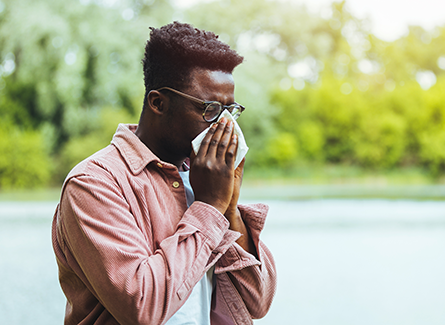
Each year, freshly cut grass, blooming trees and budding flowers announce spring’s arrival. But if you are one of the millions of Americans who suffer from seasonal allergies, the signs of spring bring months of misery. Fortunately, advanced allergy treatment services, can offer relief to even the most severe cases. Allergy treatment includes scratch testing and custom-formulated immunotherapy, an FDA-approved method to desensitize allergies. In many patients, the therapy alleviates allergy symptoms for life.
Testing is available for adults and children older than age 10 who suffer from seasonal allergies. “The testing is not painful,” explains Pierre Podrebarac, MD, an otolaryngologist with Meritas Health ENT. “A tiny comb gently scratches the skin’s surface. After the test is performed, it takes about 15 minutes to process. A positive test appears as a raised red bump on the skin, similar to a mosquito bite.”
According to Dr. Podrebarac, skin testing for 48 of the most geographically specific mold and airborne allergens remains the best way to diagnose allergic disease. Based on the test results, physicians customize a medication therapy plan that can help desensitize patients to many of the allergens that trigger their symptoms. The treatment also helps people who suffer from asthma, allergic pneumonia, conjunctivitis, undiagnosed cough, eczema, insect allergy and sinusitis.
After course of treatment, 80- 90% of patients experience fewer allergy symptoms. In many cases, their allergies completely resolve.
Relief from severe allergies may be just a phone call away. To find out what advanced testing options may be right for you, call 816.468.8820.
3 Simple Steps to Fight Pollen Allergies
Seasonal allergies affect up to 50 million people in the U.S., and pollen is the most common culprit. A doctor-prescribed allergy treatment plan is your best defense, but there are also a few steps you can take to put pollen in its place.
- Close the windows in your home and car. Set your air conditioner on recirculate, which reduces the amount of pollen that enters these enclosed areas. Avoid using window and attic fans, which blow pollen into the house.
- Schedule outside activities for late afternoon, when pollen levels are lower.
- Avoid mowing the grass or raking leaves. These activities release pollen.



